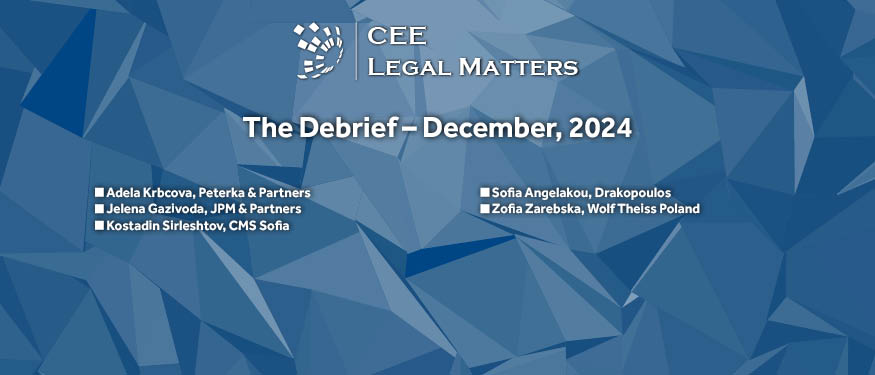Wolf Theiss, working with Arqis, has advised Constellation Capital on its acquisition of Exportverpackung Sehnde Group, including the Polish entity Export Pack Polska.
Wolf Theiss Advises McWin on Partnership with ElephantSkin
Wolf Theiss, working alongside Goodwin Procter, has advised McWin Capital Partners on its partnership with Austrian scale-up ElephantSkin.
Poland: Collusion in the Labor Market – Competition Authority Cracks Down on Anti-Competitive Practices
The Polish competition authority – Urzad Ochrony Konkurencji i Konsumentow (UOKiK) – is actively investigating potential collusion in the labor market.
Stratulat Albulescu and Magureanu, Bourdenet & Associates Advise on EUR 5 Million Investment Round for DotLumen
Stratulat Albulescu has advised Catalyst Romania Fund II on leading a EUR 5 million investment round for DotLumen, with the participation of the European Innovation Council Fund, Tigrim Capital, and SeedBlink. Magureanu, Bourdenet & Associates advised DotLumen. Wolf Theiss reportedly advised the European Innovation Council.
Schoenherr and Wolf Theiss Advise on Erste Group’s EUR 1 Billion Mortgage Pfandbriefe Issuance
Schoenherr has advised the managers involved on the Erste Group Bank’s issuance of EUR 1 billion 3% mortgage Pfandbriefe due 2032. Wolf Theiss advised the Erste Group Bank.
Kinstellar and Wolf Theiss Advise on Genesis Growth's Acquisition of Stake in LLP Group
Kinstellar, working with Luxembourg-based Brouxel & Rabia, has advised Genesis Growth Equity Fund I on the acquisition of a majority stake in LLP Group from Adam Bager, Tim Smulders, Barbara Dreska, and Jiri Stiller. Wolf Theiss, working with Ashurst, advised the sellers.
Austria: Supreme Court Confirms: Partial Transfer of Share Permissible Subject to Shareholder Approval, Despite Agreed Indivisibility.
The Austrian Supreme Court (6 Ob 224/23v) recently determined the requirements for a partial transfer of a share if the articles of association expressly stipulate that shares cannot be divided.
Wolf Theiss and Schoenherr Advise on Nokian Tyres' VPPA with Enery in Romania
Wolf Theiss has advised Nokian Tyres on a virtual power purchase agreement with Enery. Schoenherr advised Enery.
Long-Awaited Changes in Pharmaceutical Promotion in Hungary
Several amendments to pharmaceutical promotional laws in Hungary came into effect on 1 January 2025, with others following on 1 February 2025. Some of these amendments have long been urged by the pharmaceutical industry.
Wolf Theiss and CMS Advise on Erste Group Bank's EUR 750 Million Notes Issuance
Wolf Theiss has advised Erste Group Bank on the successful issuance of EUR 750 million fixed to floating rate green preferred senior notes due 2033. CMS, working with Linklaters, advised the international banking syndicate working on the issuance including Danske Bank, Erste Group, Landesbank Baden-Wuerttemberg, Landesbank Hessen-Thueringen, Societe Generale, and TD Global Finance.
SSW Advises Eika Asset Management on Logistics Project with Panattoni in Sochaczew
SSW Pragmatic Solutions has advised Eika Asset Management on an agreement with Panattoni for the planned development of a 28,000-square-meter logistics building in Sochaczew, Poland. Wolf Theiss reportedly advised Panattoni.
Croatia Introduces Legislative Changes to Promote Gender Equality on Corporate Boards
With the amendments to the Companies Act (the “Act”), which entered into force on 5 December 2024, Croatia has implemented EU Directive (EU) 2022/2381 on gender balance on corporate boards of listed companies (the “Directive”). The so called “Women on Boards” Directive aims to ensure that at least 40% of non-executive board seats or 33% of all board seats for listed companies are occupied by the “underrepresented sex” by the end of June 2026.
Disclosure of Employee Termination Reasons to the Entire Workforce
Employers often find themselves contemplating whether they should disclose the reasons for an employee’s termination to the entire workforce. While the motivations behind this consideration can be well-intentioned – such as educating remaining employees about unacceptable behaviors, promoting transparency, and preventing the spread of misinformation, there are legal implications to take into account.
The Debrief: December, 2024
In The Debrief, our Practice Leaders across CEE share updates on recent and upcoming legislation, consider the impact of recent court decisions, showcase landmark projects, and keep our readers apprised of the latest developments impacting their respective practice areas.
EU Deforestation Regulation – Application Date Postponed
Companies will have an additional year to comply with new EU rules aimed at preventing deforestation, which will prohibit the sale of products in the EU that originate from deforested land
The European Parliament and the Council of the EU have decided to postpone the application of the European Union Deforestation Regulation (EUDR) by one year, now taking effect on 30 December 2025 instead of the original 2024 deadline. The decision comes in response to concerns raised by EU member states and stakeholders about the feasibility of meeting the requirements within the initial timeframe.
The People Puzzle: Labor Shortages on the Rise in CEE
Labor shortages have emerged as a pressing issue across CEE, prompting diverse responses from governments, businesses, and the public as they navigate the challenges of workforce gaps and economic sustainability.
Czech Parliament Discusses Measures to Cut Renewable Energy Subsidies, Focusing on Solar Power Plants
A set of two measures aimed at reducing state subsidies for renewable energy sources has been approved by the lower house of Parliament in the Czech Republic on 11 December 2024. These changes, proposed through amendments to the Act on Promoted Sources (the “RES Act”) and the Energy Act, specifically target solar power plants with a capacity of more than 30 kW that were connected in 2009 and 2010.
Wolf Theiss and Dolezal & Partners Advise on Strabag Group's Acquisition of B2 Assets in Czech Republic
Wolf Theiss has advised Strabag Property and Facility Services on its acquisition of B2 Assets from Dusan Bocek. Dolezal & Partners advised the seller.


















